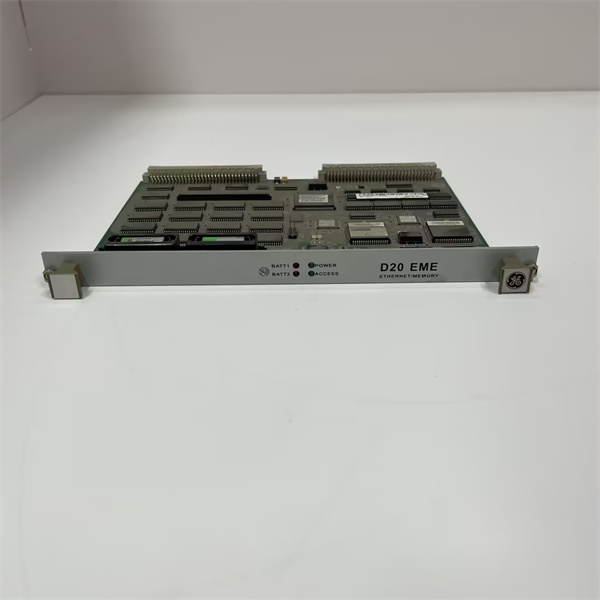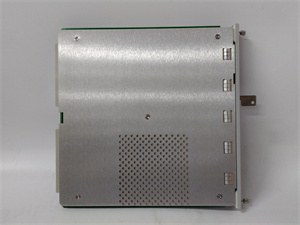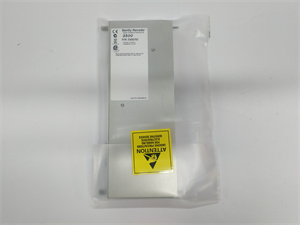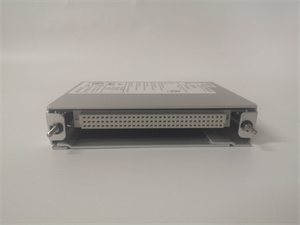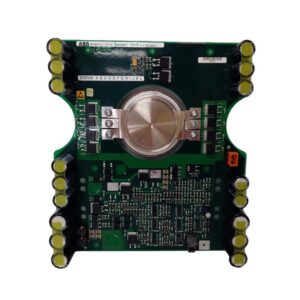Description
GE D20 EME 27 – APR – 13
Product Identification and Nomenclature
The “GE D20 EME 27 – APR – 13” likely follows a specific naming convention within GE’s product lineup. The “D20 EME” part designates it as an Ethernet/Memory Expansion Board within the D20 system, a crucial component for enhancing communication and data – handling capabilities, as seen with the D20 EME 2400 – 21004. The “27 – APR – 13” could potentially be a production date, indicating that the board was manufactured on April 27, 2013. This date information can be valuable for users in terms of tracking the product’s age, potential warranty status, and compatibility with other system components, especially when considering upgrades or replacements.
Detailed Parameter Table
| Parameter name | Parameter value |
| Product model | D20 EME (with possible relation to 27 – APR – 13) |
| Manufacturer | GE Fanuc |
| Product category | Ethernet/Memory Expansion Board for D20 system |
| Media types supported | 10 Base – T, 10 Base – 2, 10 Base – FL |
| Memory options | Available with 0 MB, 8 MB, or 16 MB battery – backed SRAM |
| Standards compliance | Compliant with EN 61000 – 6 – 2 (generic immunity – industrial) and EN 61000 – 6 – 4 (generic emissions – industrial) |
| Communication ports | 7 RS – 232/485 serial ports, 1 RS – 232 maintenance port, 2 D.20 Link HDLC ports |
| Power supply | 20 – 60 VDC, 100 – 300 VDC/85 – 264 VAC |
| Operating temperature | – 20 °C to 60 °C |
| Dimensions | 19″ wide x 5.25″ high x 8.1″ deep |
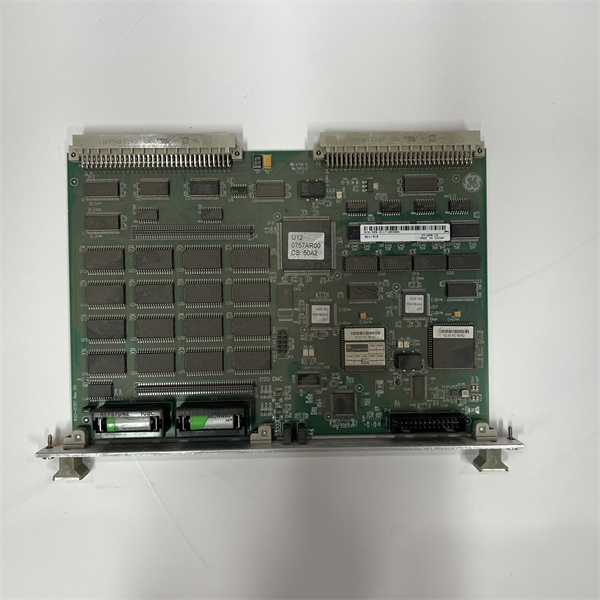
GE D20 EME 27-APR-13
Product Introduction
The GE D20 EME, regardless of the specific date – related identifier “27 – APR – 13”, is a pivotal element within the GE D20 system. Engineered as an Ethernet/Memory Expansion Board, it significantly contributes to augmenting the D20 system’s capabilities. Whether it’s a new installation or an upgrade of an existing setup, this board is designed to integrate seamlessly into the D20 framework. It provides a reliable and efficient means of expanding the system’s functionality, ensuring it can keep pace with the ever – evolving demands of modern automation and control processes.
Core Advantages and Technical Highlights
Enhanced communication capabilities: With support for multiple media types such as 10 Base – T, 10 Base – 2, and 10 Base – FL, the D20 EME can interface with a wide gamut of network setups. The presence of 7 RS – 232/485 serial ports, 1 RS – 232 maintenance port, and 2 D.20 Link HDLC ports allows for extensive connectivity. In an industrial plant, for example, it can communicate with different types of sensors, actuators, and other control devices. The serial ports can be used to connect to older – generation equipment that rely on serial communication protocols, while the Ethernet interfaces enable high – speed data transfer with more modern network – enabled devices.
Flexible memory configuration: The availability of 0 MB, 8 MB, or 16 MB battery – backed SRAM gives users the option to configure the memory according to their specific application requirements. In applications where real – time data storage and quick access are crucial, such as in a power distribution substation where continuous monitoring and control data need to be stored temporarily, the larger memory options can ensure that the system can handle a significant amount of data without performance degradation. The battery – backed feature ensures that data is not lost in case of a power outage, maintaining the integrity of the system’s operation.
Robust design for industrial environments: Compliant with EN 61000 – 6 – 2 and EN 61000 – 6 – 4 standards, this board is built to withstand the harsh electromagnetic interference and emissions typical in industrial settings. Its ability to operate within a temperature range of – 20 °C to 60 °C makes it suitable for use in various geographical locations and industrial processes. In a steel manufacturing plant, where high temperatures and strong electromagnetic fields are present, the D20 EME can continue to function reliably, ensuring the seamless operation of the control systems.
Scalability: The D20 EME is highly scalable, allowing the D20 system to grow as the application requirements change. It can be easily added to single – slot or multi – slot configurations of the D20 and D200 chassis. In a large – scale industrial automation project, as more devices need to be connected and more data needs to be processed over time, additional D20 EME boards can be installed to expand the communication bandwidth and memory capacity of the system, without the need for a complete overhaul of the existing infrastructure.
Typical Application Scenarios
Industrial automation: In manufacturing plants, the D20 EME can be used to connect different components of an automated production line. It can communicate with programmable logic controllers (PLCs), human – machine interfaces (HMIs), and various sensors and actuators. For instance, in an automotive assembly line, it can receive real – time data from sensors that detect the position of car parts being assembled, and then transmit control signals to the robotic arms and conveyor belts. The board’s memory can store the production sequence and quality control data, ensuring smooth and efficient operation of the entire production process.
Power distribution and substation automation: In power systems, this board is used for monitoring and controlling various aspects of power distribution. It can communicate with intelligent electronic devices (IEDs) in a substation, such as circuit breakers, transformers, and power meters. The D20 EME can collect data on voltage levels, current flows, and power consumption, and then transmit this information to a central control station. In case of a power outage or a fault in the system, it can quickly communicate the relevant data to enable prompt restoration of power.
Remote terminal unit (RTU) applications: In remote locations where data acquisition and control are required, such as in oil and gas pipelines, water treatment plants, or wind farms, the D20 EME can be part of an RTU system. It can communicate with sensors and actuators in the field over long distances, using the available communication interfaces. The board’s memory can store data collected during periods of limited connectivity, and then transmit it once a connection is re – established. For example, in a remote oil well, it can monitor the pressure, temperature, and flow rate of the oil, and control the pumps and valves based on the received data.
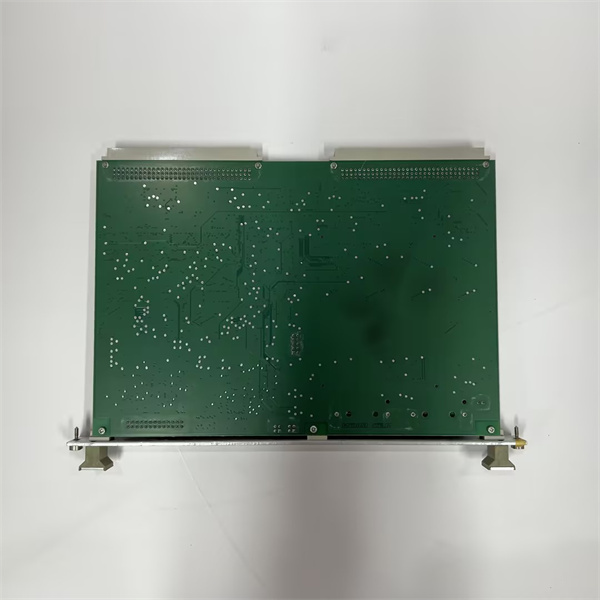
GE D20 EME 27-APR-13
Related Model Recommendations
GE D200 series expansion boards: The D200 series expansion boards are also compatible with the D20 system and can be used in conjunction with the D20 EME. These boards offer additional functionality such as more analog and digital I/O channels. In an industrial application where a large number of sensors and actuators need to be connected, combining a D20 EME board with a D200 series I/O expansion board can provide a comprehensive solution. For example, in a chemical plant where multiple temperature, pressure, and flow sensors need to be interfaced, the D200 series I/O board can handle the analog input from these sensors, while the D20 EME board takes care of the communication and memory requirements for data processing and transmission.
GE intelligent IEDs: GE’s range of intelligent electronic devices (IEDs) can work in harmony with the D20 EME. These IEDs are designed for specific functions such as power quality monitoring, motor protection, and circuit breaker control. In a power distribution network, an IED for power quality monitoring can be connected to the D20 EME board. The IED can collect data on power factor, harmonics, and voltage sags, and then send this data to the D20 system via the D20 EME board for further analysis and integration with other control functions.
Installation, Commissioning and Maintenance Instructions
Installation preparation: Before installation, ensure that the power to the D20 system is turned off. Check the D20 chassis for any signs of damage or dirt, and clean it if necessary. Verify that the available power supply meets the requirements of the D20 EME (20 – 60 VDC, 100 – 300 VDC/85 – 264 VAC). Use anti – static precautions, such as wearing an anti – static wrist strap, when handling the board to prevent electrostatic discharge from damaging the sensitive components. Familiarize yourself with the installation diagrams provided in the user manual, which show the correct orientation of the board in the chassis and the pin – out details of the various ports.
Commissioning steps: Carefully insert the D20 EME into the appropriate slot in the D20 chassis, following the installation instructions. Secure the board in place using the provided mounting hardware. Connect the power cables to the board according to the wiring diagram. Connect the communication cables to the relevant devices, such as network switches for Ethernet connections, or serial devices for RS – 232/485 connections. Power on the D20 system and check the status LEDs on the D20 EME board. The power LED should be steadily lit, indicating that the board is receiving power. Use the appropriate software configuration tools to set up the network parameters, memory settings, and communication protocols. Test the functionality of the board by sending and receiving data between the D20 system and the connected devices. For example, use a network testing tool to verify the Ethernet connectivity or a serial communication testing utility to check the serial port communication.
Maintenance suggestions: Regularly perform visual inspections of the D20 EME. Look for any loose connections, signs of overheating (such as discolored components), or physical damage to the board. Clean the board periodically to remove dust, especially in industrial environments with high levels of particulate matter. Use a soft brush or compressed air for cleaning. Monitor the system logs and performance metrics related to the board. Check for any abnormal communication errors, memory utilization issues, or power – related problems. If a problem is detected, first check the cable connections to ensure they are secure. If the issue persists, use the diagnostic tools provided by GE or the D20 system software to perform detailed self – diagnostic tests on the board. In case of a component failure, such as a memory module failure, replace the faulty component with a genuine replacement part, following the instructions in the user manual to avoid damaging other parts of the board. Also, keep the software and firmware of the board up – to – date to ensure optimal performance and compatibility with the latest system upgrades.
Service and Guarantee Commitment
GE Fanuc offers a comprehensive service and guarantee for the D20 EME. The product comes with a standard warranty that covers manufacturing defects under normal operating conditions. Their global technical support team is available to assist customers. In case of any issues, they can perform remote diagnostics and troubleshooting. If the problem cannot be resolved remotely, GE can dispatch on – site technicians.
Customers have access to a wealth of online resources, including detailed user manuals, technical specifications, and software configuration tools. Training programs are also available, either online or in – person, to help users understand the installation, configuration, and maintenance of the D20 EME. These training sessions are designed to enhance the user’s skills and knowledge, enabling them to make the most of the board’s capabilities. Extended warranty options may be available, which can provide additional coverage and services such as preventive maintenance checks. This commitment to support ensures that customers can rely on the D20 EME for reliable and efficient operation in their applications, regardless of the specific date – related details like “27 – APR – 13”.

